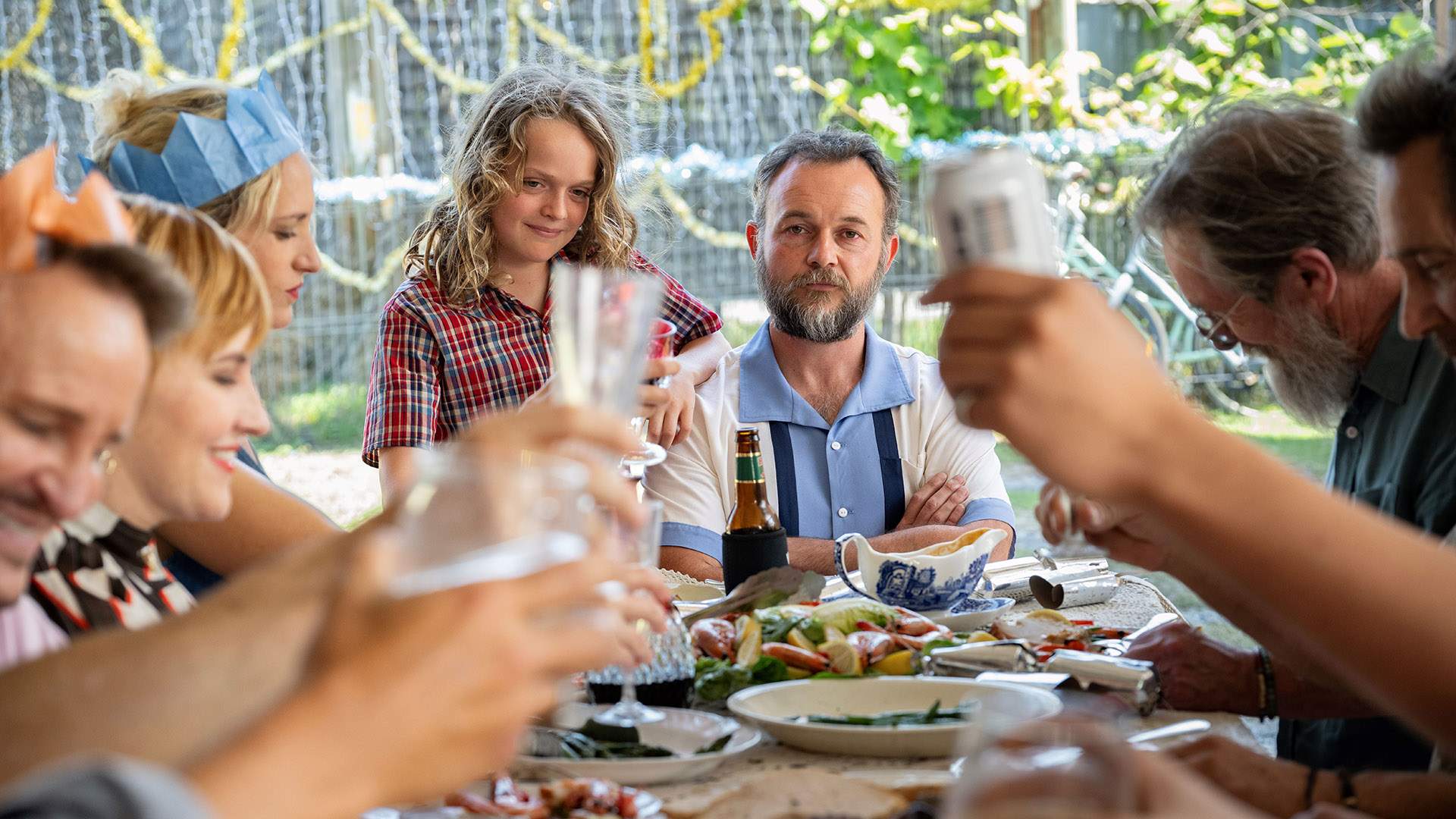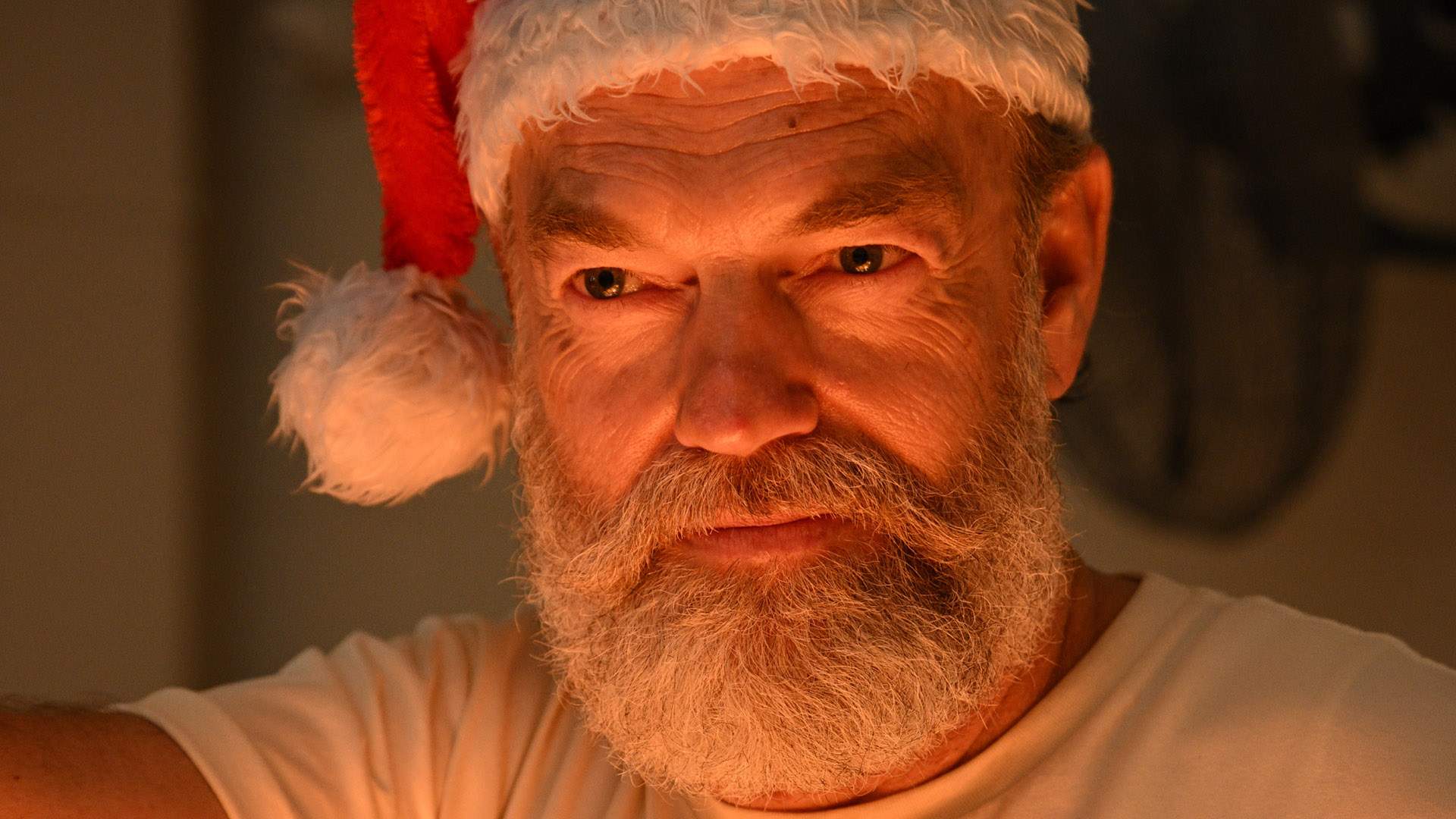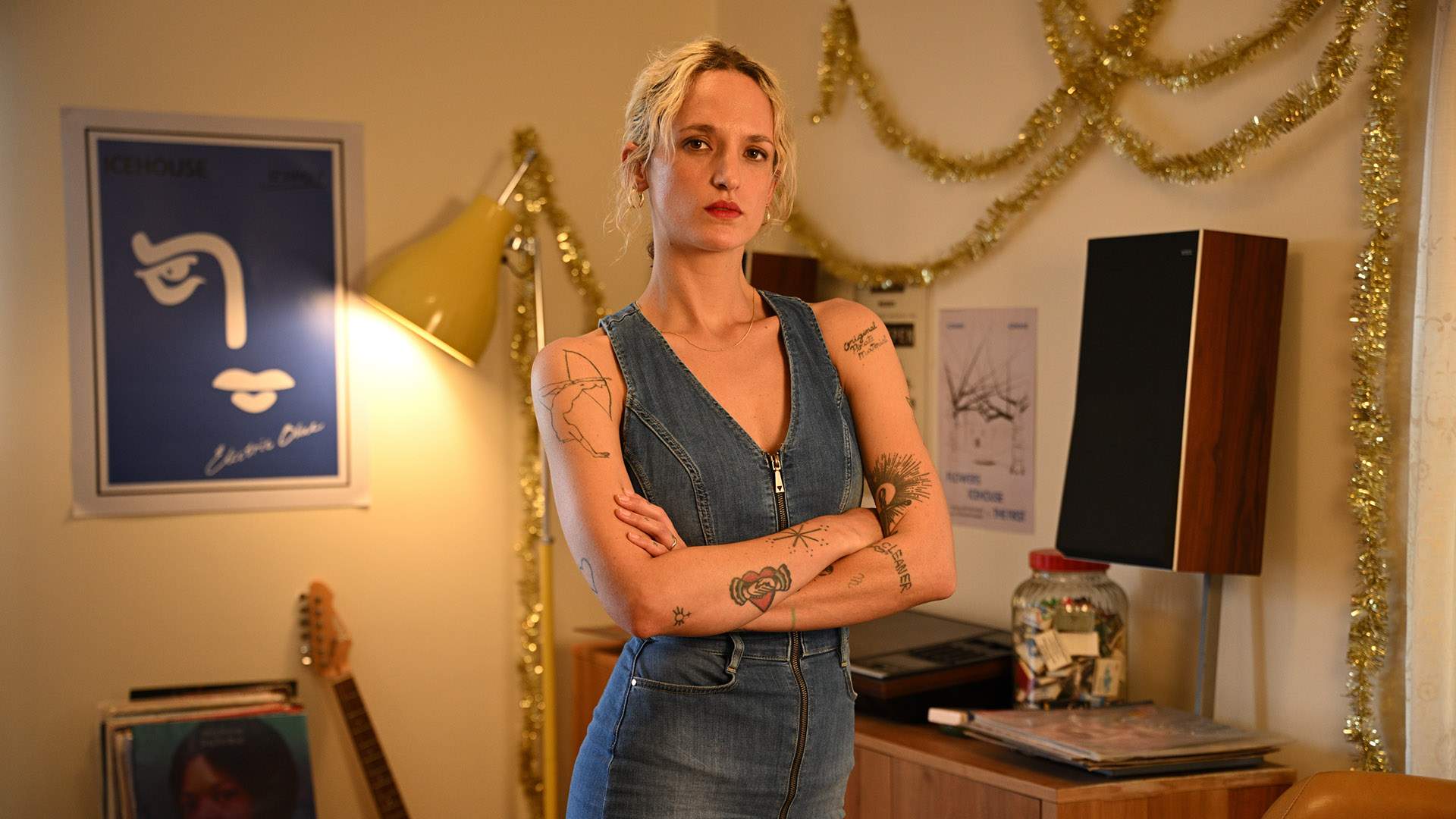Bringing a Classic Paul Kelly Song (and Christmas Favourite) to the Screen: Hugo Weaving and Daniel Henshall Talk 'How to Make Gravy'
Appreciating your loved ones, sifting through masculinity's complexities, reteaming two of Australia’s best actors: that's all part of the latest Aussie festive film.
Maybe you've tried mixing flour, salt, a little red wine and a dollop of tomato sauce. Perhaps you can't look at the last month of the year on a calendar without hearing Paul Kelly crooning "it's the 21st of December" in your head. As a song, 'How to Make Gravy' has been an Australian classic since 1996. It's one of the tunes that the great Aussie singer-songwriter will forever be known for. As a movie, How to Make Gravy is the nation's latest festive film, after musician Meg Washington and writer/director Nick Waterman first revealed back in 2022 that they were adapting Kelly's track for the screen.
The song does indeed tell listeners how to make gravy. It also unfurls a story that explores what that sauce, plus the act of sharing it with loved ones over the festive season, means to the tune's protagonist. Kelly crafts the track as a letter from Joe to Dan, reflecting on all of the things that he'll be missing that Christmas due to being in prison. "And give my love to Angus, and to Frank and Dolly — tell 'em all I'm sorry, I screwed up this time," the song advises. "And look after Rita, I'll be thinking of her early Christmas morning when I'm standing in line," it continues. "Tell 'em all I'm sorry, and kiss the sleepy children for me. You know one of these days, I'll be making gravy. I'll be making plenty, I'm gonna pay 'em all back," the tune concludes.

How do you make a movie out of 'How to Make Gravy'? For the feature now streaming via Binge since Sunday, December 1, 2024, arriving wth perfect end-of-year timing, Washington and Waterman have spun a tale based around all of the folks that Kelly mentions. The brothers driving down from Queensland, Stella, Mary and Roger: they all pop up, too. The duo has also enlisted an impressive list of actors to bring those figures and new characters to life, such as Kate Mulvany (The Clearing), Damon Herriman (Better Man), Brenton Thwaites (Titans), Kieran Darcy-Smith (Mr Inbetween) and Kym Gyngell (The Artful Dodger), plus French actor Agathe Rousselle from Titane making her first English-language film. Two of its biggest names — and two of Australia's best screen talents — sit at the picture's centre. Daniel Henshall (RFDS) is Joe, author of the pivotal message. Hugo Weaving (Slow Horses) plays Noel, who isn't mentioned in the song.
For Weaving, "the song 'How to Make Gravy' means someone wants to be making gravy with their family, so it means someone wants to be at home with their family and they're not," he tells Concrete Playground. "But the promise of the gravy is that when I am back at home with you, I will make lots and lots of gravy. So I'll make up for time lost, and I value my family, I value you and I want to gift you this thing that I can do. And I'm sorry that I've stuffed up so badly that I'm not with you. So that's what both the film and the song mean." Henshall agrees; to him, Kelly's track is about "wanting to be home and not being able to be to" and "missing the people that you love".
More than four decades since his first-ever screen credit back in 1980, Weaving's career has taken him everywhere from touring the outback in drag in The Adventures of Priscilla, Queen of the Desert (a sequel to which is on the way) to enforcing a robot-dominated world order in The Matrix franchise and playing a half-elven leader in The Lord of the Rings saga. He's starred in Marvel and Transformers movies, too, alongside a wealth of excellent homegrown fare (see: Proof, Babe, Little Fish, Mystery Road, Healing, The Dressmaker, Hearts and Bones, The Rooster and TV's Love Me). Henshall made a chilling imprint in Snowtown, then added fellow exceptional Australian flicks These Final Hours, The Babadook and Acute Misfortune to his resume. On TV, American efforts Turn and Defending Jacob are on his filmography, as are the Aussie likes of Bloom, Lambs of God, Mystery Road: Origin and Savage River. And then there's two Bong Joon-ho movies: Okja and 2025 release Mickey 17.

Ben Symons
How to Make Gravy isn't Weaving and Henshall's first on-screen collaboration. In 2023, The Royal Hotel also brought them together. Before that, 2019's Measure for Measure did the same. With The Royal Hotel and their current team-up especially, they're spending their shared time exploring the complexities of masculinity — in Kitty Green's (The Assistant) film as two of the menacing men at an outback pub, and in How to Make Gravy as inmates. After perpetrating toxic attitudes the last time that they co-starred together, they're now attempting to break free of harmful behaviours. Joe is angry before he starts serving an 18-month sentence. That fury and pain has played a considerable part in sparking his incarceration, in fact. A veteran lifer, Noel has been in similar shoes, but now both oversees the prison kitchen and runs a men's group to help his fellow detainees get in touch with their emotions.
The movie version of How to Make Gravy also hops between the events that led to Joe being behind bars and the aftermath the following Christmas — and also between his stint inside and how his family, including Rousselle as his wife Rita, Thwaites as his brother Dan, Mulvaney as his sister Stella, Herriman as her husband Roger, and Jonah Wren Phillips (Sweet Tooth) as Joe and Rita's son Angus, are coping. We also chatted with Weaving and Henshall about their first thoughts when they first heard about the project, its many layers, starring in a movie with such beloved source material, how their paths keep crossing on-screen and digging into the feature's themes.


On the Reaction When a Movie Based on an Iconic Paul Kelly Song Comes Your Way
Hugo: "Brilliant idea, really excited. Read the script — fantastic version, adaptation, realisation of the source material. And thrilling character for me. So I was all in straight away."
Daniel: "Yeah, the idea of being a part of something that means so much to so many was very exciting. And then meeting Nick and Megan and reading their script just made it even more palpable.
It was such a visceral script. And what they had done with that, how they moved away from the song, and how they had paid respect to the song and how they'd fleshed out these characters, and how they're dealing with a lot of issues underneath everything without explicitly saying that, I think it was incredibly clever.
Much like Paul's music, it's so simple in its structure, but it's so effective. And every time you come to it, you see or feel a bit more. I hope that's what this film does for people as well. I think, for me, having seen it a couple of times now, every time I see a bit more and feel a bit more."

Hugo: "The mark of a good film, actually, that. I thought 'oh, is this a different edit?' — and they go 'no, it's the same film that you saw like two months ago'.
I said 'I'm sure, didn't you cut that out or put that in?'. 'No, it's the same thing.'"
Daniel: "You get a different thing each time."
Hugo: "I think it's one of those films where when you see it, you'll see a lot each time".

On Whether There's a Sense of Responsibility When You're Starring in a Film That Stems From Such Treasured Source Material
Daniel: "Absolutely. And I think that's the initial fear — are you going to ruin someone else's experience of this much-beloved property, this song?
But this is an adaptation, and you cross over into understanding that this isn't an imitation, it's an adaptation. So they've taken it and run with it, and now we're focused on making this work from that.
We're not going to disrespect the original, but we're going to make this different version inspired by this. So you can focus on that. So the responsibility is now on the film, not to not respect the song, but not being worried about changing someone else's opinion or experience of this song. We're now focused on the film, which is a different thing.
It's a fully fleshed idea that's taken from a form in its origin, and now it's in a two-hour format on the screen in real life."

Hugo: "Lovely for Paul, too, because he had such a great reaction to it."
Daniel: "He did."
Hugo: "And I think he feels like his original, didn't he say that 'where it's moved from when I wrote it to now is so great'? And for him that's a liberation, I think. So it's great to get seal of approval from Paul Kelly …"
Daniel: "From the originator."
Hugo: "… with regard this version of the song. Good to hear. Good to hear."
Daniel: "He was very moved, which was really beautiful to see."


Ben Symons
On Weaving and Henshall's Shared On-Screen History, and How That Helped While Collaborating on How to Make Gravy
Daniel: "It's brilliant because, I mean, I'm very fond of Hugo, and so I've learned that that gives me a shorthand in communication, in familiarity, in trust, in friendship. So when we go to do something on the screen, I'm innately more open to it and I'm innately more free to play, and feel comfortable to play and not to fail.
And so what a wonderful place to start off, even before we start talking about the work. If you're already coming from that, all of that work that you can only do through experiencing somebody. It's like becoming a friend with somebody. The deeper you go with them, the more the friendship grows. And that's true of the work, too. We become more familiar with each other."

Ben Symons
Hugo: "It's nice, too, being excited by the prospect of working with Dan — having seen Acute Misfortune, for example, which was just such an extraordinary performance, and then getting the opportunity to work with that actor.
So you go 'well, I really like what this guy does, and so I hope I'm going to enjoy working with him'.
So it's been a really good journey, from Measure for Measure, tiny little scenes we had, to being in each other's orbit on The Royal Hotel — but again, prosecuting intensely toxic male psyches together and talking about that world, the world of The Royal Hotel, and then being able to progress from that toxic world into a another, a world about a more-balanced idea of what family is, and looking at how men can heal themselves. It's been a great journey, actually."
Daniel: "Yeah, yeah, yeah, it has."
Hugo: "A pleasure."


On What Weaving and Henshall Drew Upon to Dig Into Masculinity's Complexities
Hugo: "Well, the script initially, and then what that throws up for you, what work you need to do to understand that. So for me it was like 'well, if Noel's done all this work, what work have I done on myself? What sort of psychological pathways have I gone down to understand where I'm at? And what sort of work has this character done? What sort of men's-group work does he have to do?'.
So there's all this prosecution of a character that you do before any film. And you can never do enough and then, of course, at some point you've got to just jump in and do it. But always do as much as you can to make that character as complex and as human as possible."

Daniel: "For me, it starts with the conversation with the director, and their understanding of the character — and why the character does these things. And then through that conversation, I can state where I'm coming from or what it does for me, or how I respond to that.
And I think there's always a thing where at least I try to connect something that's happened to me in my life to something that's happened to the character in their life. And once I understand what that kernel of emotional history is, then you can start to flesh out those very real responses and start to understand them without judgment.
I think there's a lot to mine in this character. It's so richly written, so it does begin with the script, obviously. But there's so much more under the surface which, again, was explored through conversation and then personal experience."

Hugo: "There's massive backstory …"
Daniel: "For all the characters."
Hugo: "… for all the characters, actually. And they're just touched on. You get a very strong sense of the father having suicided some years ago, when Joe is a kid. You get a sense of Red's [a fellow inmate] background. You get a sense of Noel's background. You get a sense of Agathe's character's background and mother."
Daniel: "Just with that one conversation."
Hugo: "So all of these characters, the lives are just hinted at. So you need to find the truth of all of that, and you need to create those stories."

Daniel: "That's most of the work, isn't it?"
Hugo: "Yeah, it is. And then that brings about 'well, this character thinks in a certain way' or there's an inner monologue happening for them which is very slow or very fast. Every character has an internal world that's significantly different from others, and it's slowly finding that, tapping into that.
That's when it starts to get exciting, I think, when you start thinking like that person."
Daniel: "Yes."
Hugo: "And instinctively feeling like that person."

How to Make Gravy streams via Binge.
Film images: Jasin Boland.





